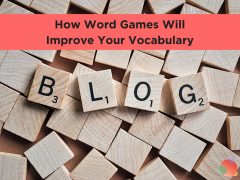 Summer days spent at the beach are a beloved way to kick back with friends and family.
Summer days spent at the beach are a beloved way to kick back with friends and family.
But did you also know that time in the ocean breeze on that striped blanket can be spent building a skill critical to the practice of public relations?
Words are the currency of PR, and growing a vocabulary takes daily practice to stretch your brain and build flexibility with language.
Not unlike yoga.
Let’s Play a Game
Games are particularly effective at introducing new phrases and words.
I’ve played games at the public beaches here in New York for as long as I can remember.
Even naming our preferred section of the beach became a word game: my children referred to it as our “share.”
My mother always went with “The Sahara.”
Both were winners in their own ways.
And once you’ve applied the sunscreen, you’ll spend many happy hours during this last gasp of summer engaging in wordplay that pays off at work.
Here are some of my favorites:
- Scrabble®: Have the dictionary app handy.
- Bananagrams®: This comes in a yellow banana-shaped cloth bag. Easy to transport and clean up.
- Six-word stories: Challenge each other to tell a complete happy (or sad or funny or inspiring) story in six words. Then, play it with five words.
- This is a fun way to instill word choice and brevity.
- I often start my classes with this game.
- It’s also a great way we kick-off brainstorming sessions with clients or at our agency.
- Hangman: The go-to game to play with children.
Reading is Cool
Reading is an excellent way to learn new words and turns of phrase.
Summer reads are particularly delicious, whether fiction, non-fiction, science fiction, or fantasy.
Almost every genre, including graphic novels, puts words right in front of you.
I’ll never forget a “60 Minutes” interview with rapper Eminem, where he was explaining to Anderson Cooper how he regularly reads the dictionary to collect words he can use in his rhymes.
He thinks of this as “stacking ammo.”
Now that’s a phrase you don’t forget easily.
Listening to Podcasts
Listening to podcasts featuring a variety of speakers—writers, inventors, scientists, executives, and philosophers—is a fun and good use of time under the umbrella.
The Browser offers a new podcast six days a week.
And I also like The Moth.
Rewards and Consequences
There are rewards as well as consequences to words used in communications.
For example, in April 2010, former BP CEO Tony Hayward famously stood on a polluted beach strewn with oil-slicked birds and exclaimed to the attending media, “I want my life back.”
Those five words were uttered in frustration after he was thrust into the media glare following the explosion causing the worst oil spill in U.S. history.
He made a lasting impression, and it was a costly toll in not only dollars but more importantly BP’s and Hayward’s reputations.
Whether spoken, written or conveyed through video or sign language, words are virtually everything in brand communications.
They make strong and lasting impressions and choosing the right ones at the right time helps build (or rebuild) relationships and reputations.
Quality and Quantity
The more words you have at your disposal, the more likely you can effectively articulate a brand message or develop a persuasive and powerful narrative.
According to the philosopher Aristotle, three elements are required for arguments to be successful.
The first is ethos, or character and credibility, both critical to PR.
The second is logos or logic.
The third is pathos or emotion.
Words power each of these elements.
And you need quality and quantity at your disposal.
Avoid the Jargon
Fluency can help to avoid jargon.
Every industry has a set of vocabulary with which it associates.
Typically, people outside that particular space have no idea what the jargon means and tend to tune it out.
While there are always “it” words that catch on and find resonance (the current one seems to be “pivot”), it makes sense to note the word and use it sparingly.
Inevitably, these words will be overused and eventually become hackneyed (as “storytelling” has) to the point their meaning is anyone’s guess.
Occasionally in PR, we invent a word which becomes the centerpiece of a creative campaign.
My agency is currently working on naming product brands in the healthcare space and being facile with the construction of words—prefixes and suffixes, the mouthfeel of a word, knowledge of word roots—contributing mightily to the process.
So when you’re packing the cooler and beach bag during these last few weeks of the summer, throw in a book, travel Scrabble, and your headphones.
Not only will you have a good time, but it will also be a great career move.